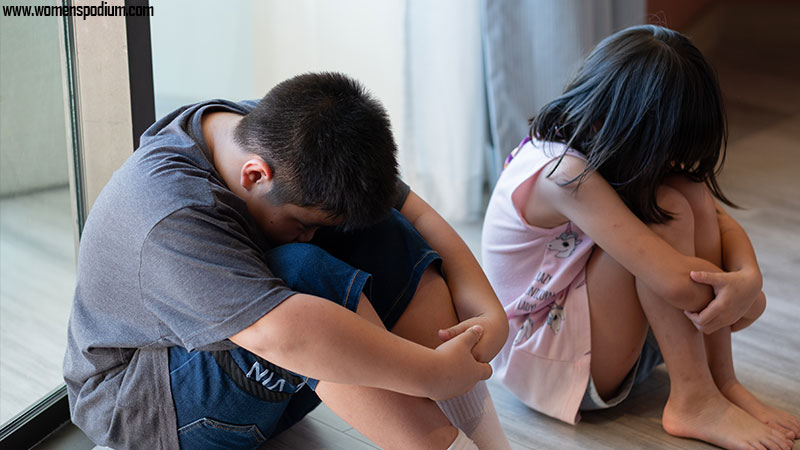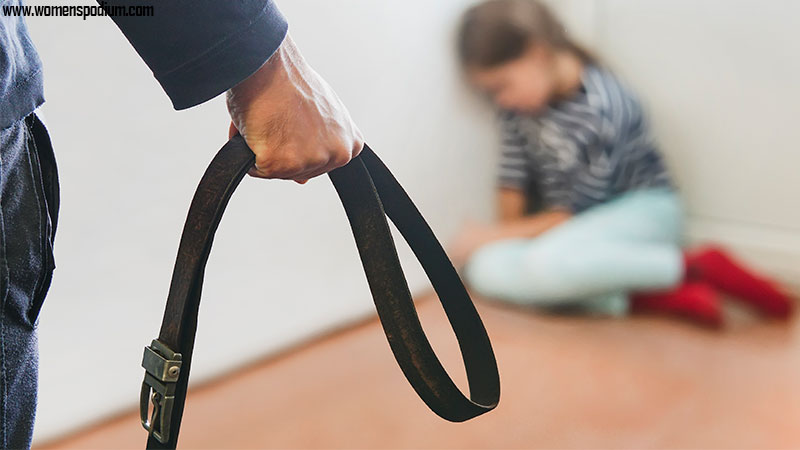
We often think parents are a safe haven from the harsh world outside, but this is not always the case. Not all parents live up to the expectations of parenthood, and their children suffer from emotional, verbal, physical, financial, sexual, or spiritual abuse at their hands. In 2020, the United States received 3.9 million child maltreatment report referrals, with 90.6 % of victims being abused by one or both parents. Victims of parental abuse can be infants, toddlers, school-age children, teenagers, or even adults. The abuse continues until either the parent changes his behavior or the child becomes independent enough to leave the abusive environment. Oftentimes, many children live in a dilemma about child abuse situations; therefore, how to know if your parents are abusive becomes a must if there is any doubt or confusion.
How To Know If Your Parents Are Abusive?

I will never be the same parent to my kids, the way my parents are to me.
— Child of Abusive Parents
1. Abuse Has Long Term Detrimental Effects On The Victim’s Personality And Brain Development

A child that’s being abused by its parents doesn’t stop loving its parents, it stops loving itself.
Abuse from parents permanently damages a child’s personality leading to ego deficits, paranoid traits, and predisposing him to mental health disorders. Medical studies show that individuals who have suffered abuse or neglect experience significant brain changes resulting in a smaller hippocampus, reduced grey matter, and increased reactivity in the amygdala in the face of potential threats.
2. It Is Not Always Easy To Identify Abusive Parents, But You Can Do It Once You Are Aware Of The Red Flags

Victims of parent abuse often take years to recognize the maltreatment, owing to the fact that the abuse occurs in the home, which is supposedly the safest place for a child, by a person who is seemingly a protector and nurturer.
One can identify abusive behavioral traits in parents by observing certain red flags, but first, one must be aware of what they are. Here are some examples of abusive parental behavior and how they manifest themselves in the life of a child.
3. Displaced Aggression And Anger Towards The Child, Either Verbally Or Physically

Abusive Parents use anger to discipline their children, and once this becomes a habit, such parents also begin to direct their angry feelings about personal issues toward their children. They express their rage verbally by criticizing whatever task the child is doing, questioning their child’s worth, or mocking their child’s ability to do something. This type of mental cruelty happens on an everyday basis, and children come to accept this kind of emotional abuse as normal.
Abusive Parents may also use their child as bait in anger, leading to the physical form of abuse, such as twisting the arm or ear of the child or throwing something in the child’s direction. They raise their children with a mindset that it isn’t abused as long as it doesn’t leave a bruise.
In case of extreme physical abuse, which leaves a scar, they manipulate the child with guilt, claiming that it was the child’s fault that he enraged the parent and it is better to lie if someone questions about the injury.
Just as Marcia Sirota said:
In troubled families, abuse and neglect are permitted; its the talking about them that is forbidden.
4. Use Of Deprivation From Basic Needs As A Tool To Exert Control Over The Child

Abusive parents hold their personal interests superior to the child’s needs and desires. They don’t allow their child to live an autonomous life driven by his individual will as they prefer to be in complete control of their child’s life. So whenever anything happens against their will, they try to cut off the child’s needs in order to force him to give up, such as by denying him food, isolating him physically and emotionally, and depriving him of day-to-day ordinary things and activities. This kind of behavior puts a strain on the child’s mind, and he withdraws from his choices and decisions.
5. Resorting To Harsh Punishments In The Name Of Discipline

This is all part of a child’s upbringing. Parents play an integral role in training the child and helping him learn the difference between right and wrong, teaching him discipline and all the valuable lessons of life. But some parents display abuse of such authority by punishing their child rather harshly if he makes a mistake. Corporal punishments, long-term grounding, locking the child in a room for hours, and keeping a stick in the house to instill fear in the child are all cruel ways of punishment. Abusive Parents call this type of punishment a technique to discipline the child, whereas it causes emotional dysregulation and brain shrinkage in a child.
Also Read: Be sensitive when it comes to children, and stay away from these parenting mistakes.
6. Shame And Humiliation Without Any Regard For The Child’s Self-Respect

Abusive parents may humiliate their child in front of others by discussing his failures and shortcomings, calling him names in front of his peers, and sharing stories from his private life for a quick laugh. This demeaning behavior undermines a child’s self-esteem and leaves him socially embarrassed. If a child makes a mistake in public, beating him and yelling at him in front of everyone violates a child’s dignity, leaving the child feeling ashamed of his act in front of others.
There is no greater inhumanity in the world than hurting or belittling a child.
7. Financial Abuse And Undue Interference In A Child’s Financial Affairs

Parents keep a check and balance on their child’s expenditures and finances, which is quite normal. Still, it becomes a form of abuse when parents begin to take advantage of such control for personal benefits or withhold their child from achieving financial independence by stopping their child from having a job or putting an undue financial burden on him.
Opening credit cards or keeping bills in a child’s name without having his consent is financial abuse and identity theft. It is also financial abuse to guilt-trip the child into giving his savings and earnings to his parents, as well as emotionally blackmailing him into catering to all of his parents’ financial needs against his will. Abusive parents raise their children as a retirement plan, jeopardizing their child’s financial stability with endless debt.
8. Sexual Exploitation – The Most Alarming Form Of Abuse

A child may face sexual abuse from a biological or step-parent. In this case, they should seek help immediately, but sometimes a child fails to understand that it is abuse, especially in its initial stages. Even if the child understands, the perpetrator silences him by making him afraid of shame and hurt.
It is not in a child’s hands whether they have abusive parents or not but seeking help, getting out of the toxic situation, and allowing themselves to heal can slowly reverse the psychological and emotional damage in a child’s life.
It may feel like a tragedy that your parents are not the parents you wished for, but accepting this reality brings freedom, and with freedom comes healing. Hope this article helps how to know if your parents are abusive?
Also Read: Every parent-child relationship is different and diverse in its own way. There are some clear parenting styles that leave an everlasting impact. Let’s explore uninvolved parenting in a little bit of detail.





